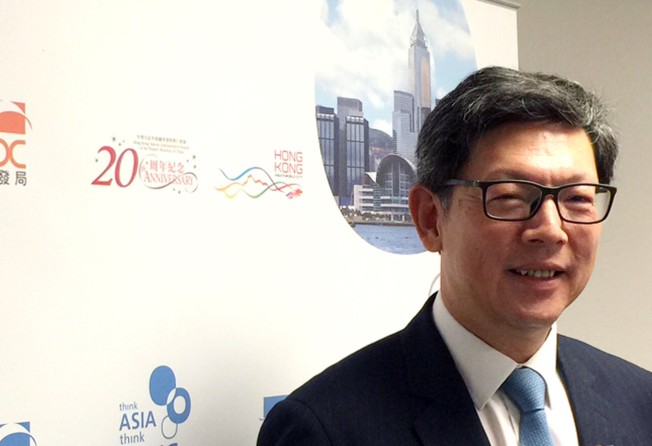Hong Kong Monetary Authority set to invest in international infrastructure developers
News comes just days after the authority agreed to provided US$1 billion to a programme to support infrastructure projects in emerging markets

The Hong Kong Monetary Authority will cooperate with several pension or professional funds to invest in infrastructure developers in a bid to further tap into Beijing’s “Belt and Road” trade initiative and strengthen Hong Kong’s international financial status.
The announcement from Norman Chan Tak-lam, head of the city’s de facto central bank, came days after the authority agreed to provided US$1 billion to a programme run by the World Bank’s International Finance Corp (IFC) to support infrastructure projects in emerging markets. The HKMA’s commitment to the managed co-lending portfolio programme (MCPP), a syndicated loan platform, could help boost its investment returns.
Since establishing the Infrastructure Financing Facilitation Office (IFFO) in July 2016, the HKMA has been keen to strengthen Hong Kong’s status as an international financial centre by pooling together interested equity and credit investors for infrastructure investments in emerging markets.
Last month, Chan said that the office will set up new mechanisms so that the Exchange Fund, which holds Hong Kong’s reserves used for defending its currency, can be used to cooperate with international funds to invest in “good projects” in countries under the Belt and Road initiative, a trade strategy which spans Asia and Europe.
Speaking on the sidelines of a trade symposium in London, Chan said the authority’s commitment to the MCPP was “partly related” to his pledge in August.
“The IFC doesn’t offer any equity investment products ... but we are interested in that, so equity investment will be our next and second track,” he said.
“We are discussing with three to five like-minded pension and professional funds in finding good projects and invest in equity together.”
The IFFO has 77 partners, including the National Pension Service of South Korea and the state-owned energy corporation China Hua Neng Group’s Hong Kong branch.
Asked if China Hua Neng will be involved in the new equity investment programme, Chan only said the discussion has involved large state-owned corporations as a lot of their projects were already operating in Belt and Road countries.
“We are hoping to package several projects together … including some ‘greenfield projects’ that are under construction, as well as ‘brownfield projects’ that are already completed and operating,” he added.
Chan explained that investing in the former would be riskier, but the return is also likely to be higher, while investing in the latter would reap lower returns. Therefore, investing in a package of infrastructural projects should result in a “reasonable return in a time span of about 10 years”, he said.
As of March 31, the Exchange Fund had total assets of HK$3.76 trillion (US$482.29 billion), comprising HK$2.55 trillion in bonds and HK$467.8 billion in overseas equities.
After the HKMA’s commitment of US$1 billion to the co-lending programme was revealed last week, some economists questioned if the authority was allowing the World Bank’s International Finance Corp to have a say on part of the Exchange Fund.
But Chan said it is natural that the authority, as the lender, would not have a say on how the borrowers, including the developers in emerging markets, spend the money.
“It’s the same with equity investment: passive equity investors would not want to actively manage a hydroelectricity plant … They just wanted to find good projects to invest and good managers to manage it,” he said, adding that the IFC has a good track record in funding projects.